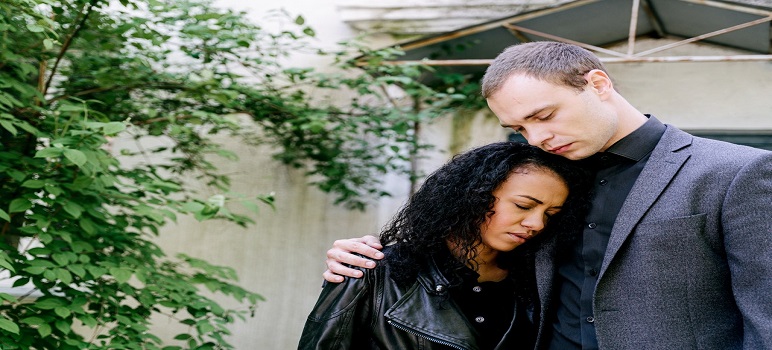
How to Cope with Grief on the loss of a close friend or family member is one of the most difficult tasks we can undertake. The loss of a partner, a brother, or a father can be very traumatic. While we may accept death as a necessary part of life, shock and confusion can nevertheless overwhelm us, resulting in prolonged bouts of despair and depression.
Each of us reacts differently to death and develops our own coping mechanisms to deal with the resulting pain. According to research, most people can heal from loss with the passage of time provided they can rely on support from their social surroundings and keep good behaviours. Accepting the death of a close relative can take months or even a year. There is no such thing as a “normal” period of sorrow.
Additionally, you should not expect going through “grief phases” – new research indicates that the majority of people do not go through these stages. If you had a contentious connection with the deceased, this might add another layer of complexity to the grieving process. You may need some time to contemplate before you can see the relationship through new eyes and adjust to the loss.
When we consider that the majority of us are capable of overcoming loss and continuing our lives, we recognise that human beings are born with an innate ability for resilience. However, some people don’t cope with grief and experience sadness for a longer period of time and become unable to carry out regular duties. These individuals may be experiencing what is known as difficult grieving and may benefit from the assistance of a competent mental health professional, such as a grief specialist psychologist.
How long is the grief expected to last?
To be sure, there is no such thing as a “normal” duration to cope with grief. For the majority of people, it takes between six and twelve months; for others, it may take slightly longer. On the other hand, the duel is divided into numerous stages. Five stages, as defined by psychiatrist Elisabeth Kübler-Rossen in her 1969 book On Death and Dying: denial, anger, negotiations, emotional pain or sadness, and acceptance.
However, in the majority of situations, the phases do not follow this order, and frequently, not even all of these stages are present. In other words, each individual tries to cope with grief in their own unique way. There is no generalized way of grieving! What the specialists do offer is advise on how to deepen the duel and navigate through the scenario with the least amount of trauma and without it continuing longer than necessary.
Bertrand Regader, director of the Psychology and Mind website, highlights some critical elements for confronting and overcoming this loss. Some of them are listed below.
How to Cope with Grief?

1. Acknowledge your emotions
Someone who has lost a loved one may experience a variety of emotions during their sorrow. Several of them are manifested in the aforementioned stages of grief: anger (directed at the world, the deceased, or at oneself), denial, sadness, and frustration. However, other symptoms frequently manifest as well, including tiredness, guilt, helplessness, worry, despair, insensitivity, relief, perplexity, emptiness, and terror.
The trick in this scenario is to allow yourself to experience such feelings, even if they appear to be incorrect from a rational standpoint. Our brain gradually adapts to this new reality, thus assimilating the loss.
2. Surround yourself with supportive people
Discussing the emotions evoked by the loss aids in the process of assimilation. To cope with grief, It is not at all advisable to isolate oneself. Doctors advise persons who are grieving to socialise as much as possible, seeking the complicity of their closest circle.
According to a document issued by doctors at the University of Navarra Clinic (CUN), “The exhaustive and redundant explanation of death is cathartic: it cleanses, purifies, and opens the faucet of emotion, while also liberating, organising, and structuring the mind. It virtually normalises and aids in the process of overcoming death.”
3. Take good care of your health
A balanced diet, physical activity, and appropriate relaxation and sleep are critical components of maintaining physical and emotional health to overcome grief. And this, in turn, is critical for making the loss process more bearable, for arming the body with the required energy to deal with negative thoughts, and eventually, for moving on.
4. Try to remember the good old times
Although it might be difficult to cope with grief, remembering the pleasant times spent with the departed can help, as it helps to detach the deceased’s image during his final days (if it was caused by illness) or the shock caused by the news of his death (if it came suddenly). In this regard, it is critical to investigate what happens around death in different cultures, where this loss is not experienced in the same way as in ours.
Katherine C. Nordal, executive director of practises for the Psychological Association of the United States, highlights several actions that can be extremely meaningful in commemorating and celebrating the life of the deceased, from collaborating with a charity to framing photos of happy times spent together to planting a tree or garden in his memory.
5. Take help from a psychologist
According to CUN professionals, “the most significant support that a person receives following a loss comes from friends and family, but therapeutic help might be beneficial in cases of difficulty overcoming the loss.” According to Regader, “psychological counselling assists mourning individuals in reinterpreting their emotions and thoughts, equipping them with the tools necessary to cope with grief on loss of a loved one.”
Additionally, therapeutic assistance can assist in coping with events such as dates and important occasions: the deceased person’s birthday, the first Christmas without him, the anniversary of his death, and so on.
These are moments that can result in “new shocks of pain that surprise and demoralise,” according to the Navarrese experts, “so it is advantageous to take them into account in order to anticipate their arrival, guessing or imagining how they will live, or to ascertain their impact and aftermath if they have already occurred.”
How to accompany a grieving person?

There is another critical perspective on these types of situations of bereavement for a loved one: that of those who accompany the bereaved. What counsel may be given to people who should be a source of comfort and support at such times of bereavement? Nicolás Moreno, a psychologist, makes a series of recommendations in this regard.
It is critical not to attempt to restrict the sufferer’s expression of emotions or to pretend that the sufferer assumes a role determined by criteria other than their own. Not only are phrases like “do not worry about this anymore,” “you must be strong,” and “think about others” impossible to fulfil during the duel, but they are also harmful. Neither are comments such as “I understand how you feel” acceptable, as each duel is unique and specific, nor is the expression “time heals wounds,” as it is worthless to people trapped in misery.
What is recommended is to accompany: take the initiative to call or visit a sick person. Do not say “call me” or “come see me if you need anything,” as persons who are depressed are unlikely to want to call or visit anyone. Of course, “fleeing at the smallest expression of painful feelings” is not recommended, according to Moreno. As previously stated, one of the keys to cope with grief is to discuss death and the person who is no longer present. These are challenging times, but essential ones.
In a similar manner, another of the key advice is to “keep your ears open to hear pain, sadness, anger, frustration, loneliness, and all the other emotions associated with mourning.” Also, it is considered better if you listen to them 80% of the time and speak just 20%. Additionally, it emphasises the importance of being aware of any signals that appear strange or distorted, as they could be indicators that the sorrow is escalating. Both in this scenario and if the grieving persists for an extended period of time, therapeutic help becomes critical.
Also Read: How to overcome the fear of public speaking